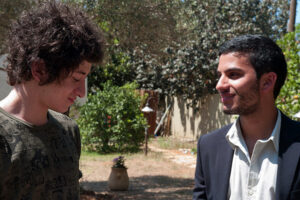There are a lot of ways Lorraine Levy could have gone with the premise of “The Other Son,” opening in limited release Friday. Thankfully, she took the least-expected one.
A switched-at-birth tale, “The Other Son” raises the stakes on what is already an emotionally charged situation. Her story – of two families who discover that their college-age sons were switched at infancy in the hospital by mistake – is in Israel. One family is Israeli and lives in the affluent Tel Aviv suburbs; the other is Palestinian and lives behind a wall, with military checkpoints between them and the rest of the city.
The discovery comes about innocently enough: Joseph (Jules Sitruk), the son of an Irsaeli military commander, has taken his physical to join the army. Army service is his duty, but he’s really more interested in college, girls and playing music. But his mother, Orith (Emmanuelle Devos), a doctor, is shocked to discover that Joseph’s army physical shows his blood type is a genetic impossibility – unless he isn’t actually her son.
This leads to an investigation that produces the revelation: On the night that Joseph was born in 1991, terrorists shelled the part of Tel Aviv where the hospital was. The babies, including Joseph, were evacuated to safety – at which point Joseph was swapped unwittingly for Yacine (Mehdi Debhi), the son of a Palestinian mechanic.
Yacine has grown up with the Palestinian struggle in his foreground, though his parents have sent him to Paris to school, to get him away from the violence and discrimination. But he returns for his summer break to discover that, in fact, he is not who he thought he was.
It’s like a slap to Joseph, who considers himself a Jew. He is shocked when the rabbi who performed his bar mitzvah informs him that, no matter how he feels or what he thinks, Jewish law says that, in fact, he is not Jewish.
Yacine, meanwhile, is exposed to an entirely new world: one of freedom and abundance. But he also finds that this change in identity has turned his militant brother against him.
Who are these boys now? And who will they become? How will the seeming political stalemate of regional hatred and enmity shape them in new ways?
This review continues on my website.

